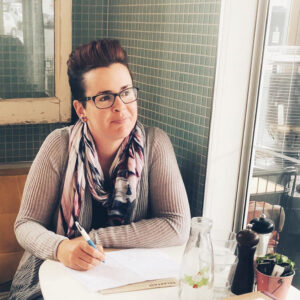It’s interesting how, when the seasons start changing from Summer through to Winter, and the days become shorter, the ‘mood’ of people begins to change too.
I noticed this last year around March. This year it’s cropped up a bit later in the year, in April. I’ve started to pick up on this because people begin reaching out to me in regards to their mental health, more so, around this time of the year. So I thought it would be of value to you, and anyone who else who struggles with The Blues over the Winter months, to share what helps me to manage my depression.
I know from experience that when you are in it it’s really hard to see the light. There’s that fog, that heaviness and the feeling of just surviving. A feeling of wanting to sleep all the time and not wanting to exist in the world.
So, firstly, I just want to remind you that you are not your thoughts. They are not you. It’s just your brain and mind taking over. If that sounds confusing, check out 5 Things I Learnt at Depression Counselling. That was one big realisation for me – I am not my thoughts. I am my values and what I actually want from my life. YOU ARE NOT YOUR THOUGHTS!
FUN FACT: Women have approximately 85,000 thoughts a day. What blows my mind is that 80% of those thoughts are negative. WTF?!
Goes to show that our thoughts, or our mind, have taken over. Ridiculous! So, with this in mind, I want to share with you some things that help me, day-to-day, to manage those thoughts and my depression.
1. Journal
If you have no one to talk or feel like you don’t, I highly recommend getting a journal.
I feel like it’s a 24/7 counsellor or therapist because any time of the day you can write in it and download all those thoughts that are taking over your mind.
For me, journal writing is cathartic . . . getting down on paper what’s going on in my head, helps me to process my thoughts.

Sometimes too, when you get your thoughts and internal chatter out on paper, they can start to feel normal. I read back on my journal entries and will sometimes say to myself, “Oh my gosh! That doesn’t even make sense. Why am I even thinking that way?”
SO, I highly recommend getting a journal!
It’s entirely up to you what type you get. If you really want to make journalling a part of your daily routine, I suggest getting a journal that you LOVE and will inspire you to write in it regularly.
2. Brain dump
If stress and overwhelm affect your mood, then I highly recommend doing a Brain Dump.
Literally get a piece of paper or download my Brain Dump Fun-Sheet. For 5-10 minutes simply dump everything that is going on inside your head onto the paper.
You will soon see that there are so many things that are taking up energy inside your head and are out of your control. These things will be affecting your mood so definitely give this a go.
3. Gratitude
Obviously one of those buzz words at the moment. I know, I know . . . while you’re in it, feeling dark and depressed, it’s hard to see the good things in life.
BUT when you are in a state of gratitude, or really trying to think of good things, you will find there is a pause on some of the dark stuff that is going on in your head.
If you really struggle to think about the good things, then I recommend this book my beautiful friend Sharleen bought me. Count Your Rainbows : A Gratitude Journal by Jenny Mecher. I love it because it made gratitude easy.
One of the first pages I did in this book because it seemed real easy was:
GRATITUDE PROMPT 1: Start listing all of the good things in your life. As the day goes on add more as you think of them. How many can you come up with? Try to fill this whole page today.
I literally filled the page within minutes.
There things like music – I love music – fresh air, sunshine, ice cream, listing my friends that I was really appreciating and grateful for at the time. I also wrote down my counsellor because she is a light for me as well.
So just list all the good things in your life. See what comes up for you.
And again, if you need it to be super easy, you don’t want to have to think about it too much, another example out of the book which is really easy is:
GRATITUDE PROMPT 2: Take a walk around your living space. Pay attention to the things you use almost every day but probably otherwise would never really think about. How do they make your life easier, happier, more comfortable?
One that came to mind quickly was the fan in my bedroom. I don’t know about you, but it is still warm at night and if it is too hot, I don’t sleep very well. So, I am really grateful to have the fan in my bedroom to cool me down, so I sleep better. Try to think about simple things like that.
The two things I try to do daily now is write in my journal and include some daily gratitude so I can appreciate the good things in my life. EVERY. DAY.
4. Visit your GP
If you are really struggling, and you feel like you have been struggling for quite some time, I would highly recommend getting to your GP. That’s what I did. It took some time for me to actually book an appointment but I got there.
Your GP will get you to do a test to see where you are sitting on the ‘scale’ and they can point you in the right direction for a counsellor or therapist. There are also subsidised programmes for people who are high need for counselling services.
There are lots of helplines too so if you find you can’t get to your GP for an appointment because you’re really busy with work then definitely contact one of the helplines. The person on the other end of the phone is trained to help with what you’re going through.
I’d highly recommend calling one of these helplines especially if you find your friends and family don’t understand what you’re going through.
Also, while you’re at the doctor, they will have a conversation with you about three things that contribute to what’s going on with your mental health. Sleep. Exercise. Diet. Stress is another one.
Easier said than done, I know!
It’s really hard for people to understand the intensity of your feelings – the darkness, the fog and the heaviness – if they’ve never felt it or dealt with it themselves. So please get support from someone who can understand and help you to deal with what’s going on for you.
5. Meditation
Another thing, that I have only recently started committing to, is meditation.
I know, I know . . . How do we slow down the thoughts when our your minds are turning with all-the-thoughts 24/7?
I have decided that mediation needs to be a practice. The more I practice, the better I will get.
At the moment I am sitting in complete silence for 7 minutes and next week I will upgrade it to 15 minutes. But that is from me doing guided mediation since the beginning of the year, then getting to a place and thinking, “You know what? I probably need some quiet because my brain is always turning over.” I know this going to take practice for me. There are some really good apps for mediation – Calm and Headspace are ones I’ve used. I know Gabby Bernstein has some really good, free meditation resources which you may like.
Don’t forget that there are different forms of meditation too.
I had a chat with a friend recently . . . for her, meditation is colouring-in before bedtime. She finds that when she’s colouring in, she’s focusing so hard on staying in the lines and choosing the colours for her drawing, that her mind switches off.
Find a form of ‘meditation’ that works for you. If you find you can’t sit still and be quiet, then find an activity that helps you to do so. It could be knitting, colouring-in, craft, crystals . . .
I have lots of crystals so for me, meditation could just be me sitting and holding a crystal and focusing on it.
Whatever you decide your form of meditation will ‘look like’, make sure you take the time to sit, be calm and be present.
But just start. It could be that you start off your practice with just 2-3 minutes a day. and that’s great!
6. Supplements
I was on anti-depressants a few years ago and they didn’t work for me. I tried two different types. You can read more about it here.
When I decided that anti-depressants weren’t for me, I had to find something else that would help me to manage my depression.
Through my research, I discovered the importance of Omegas and GOOD Omegas at that. Both Omega 3s and Omega 6s.
Also, Magnesium. I learnt too that if you are taking magnesium you also need calcium as it helps your body to absorb the magnesium.
Our diet, and what we fuel our bodies with, has SO much to answer for in regards to our mental health. If you know that you don’t have a very good diet, that you’re probably missing out on a whole lot of nutrients and stuff, please consider getting a really good supplement.
If you want to know what supplements I take and swear by, email me.
There is so much science behind the power of good supplements and them supporting mental health, so please take the time to find one that works for you.
7. Essential Oils
I believe essential oils were my saviour. Seriously!
And whether it was the ‘placebo effect’ or not, they really did help me to manage my moods and feel empowered with my mental health.
 Now I use them daily without fail. I’ve created simple daily habits, that incorporate my oils, that have kept me on an ‘even keel’ for the past few years.
Now I use them daily without fail. I’ve created simple daily habits, that incorporate my oils, that have kept me on an ‘even keel’ for the past few years.
I wear a diffuser bracelet most days, I use the oils as perfume, I diffuse in my house during the day and at night, I diffuse them in the car, there’s a few oils I pop under my tongue every morning to help me feel balanced . . .
They are more than just nice smelling smells LOL. We use them for cleaning, flavouring, keeping us well, first aid etc. They have seriously changed our lives. My Silver Fox is even on board and carries Peppermint in his work bag ALL THE TIME.
If you haven’t tried essential oils for supporting your mood and what’s going on for you emotionally, I am more than happy to share with you what works for me. Flick me a private message or an email and let’s chat.
I wanted to share all this because I want to see lots more people living joy filled lives. But more importantly, I want more people to be living empowered lives when it comes to their physical, mental and emotional health.
I know that what goes on in your mind can totally take over and I know coming into Winter it is going to be really hard.
So just start with one small thing. Take one suggestion from above and put it into practice. Every Day.
It probably won’t make a difference the first or second time but it’s the consistency and daily habits that will pay off long term.
You got this! And I’ve got your back

